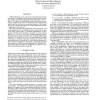Free Online Productivity Tools
i2Speak
i2Symbol
i2OCR
iTex2Img
iWeb2Print
iWeb2Shot
i2Type
iPdf2Split
iPdf2Merge
i2Bopomofo
i2Arabic
i2Style
i2Image
i2PDF
iLatex2Rtf
Sci2ools
211
click to vote
ICCAD
2003
IEEE
2003
IEEE
Hardware Scheduling for Dynamic Adaptability using External Profiling and Hardware Threading
While performance, area, and power constraints have been the driving force in designing current communication-enabled embedded systems, post-fabrication and run-time adaptability is now required. Two dominant configurable hardware platforms are processors and FPGAs. However, for compute-intensive applications, neither platform delivers the needed performance at the desired low power. The need thus arises for custom, application-specific configurable (ASC) hardware. This paper addresses the optimization of ASC hardware. Our target application areas are multimedia and communication where an incoming packet (task) is processed independently of other packets. We innovatively utilize two concepts: external profiling and hardware threading. We utilize an M/M/c queueing model to profile task arrival patterns and show how profiling guides design decisions. We introduce the novel concept of hardware threading which allows on-the-fly borrowing of unutilized hardware, thus maximizing task...
Related Content
| Added | 04 Jul 2010 |
| Updated | 04 Jul 2010 |
| Type | Conference |
| Year | 2003 |
| Where | ICCAD |
| Authors | Brian Swahn, Soha Hassoun |
Comments (0)

